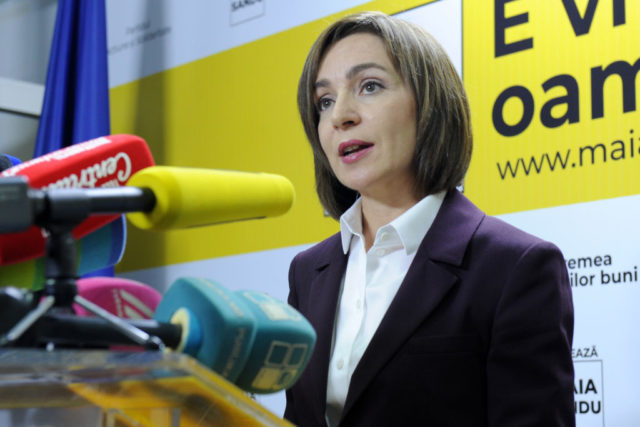
Moldova’s Parliamentary Elections May Produce a Sea Change (Part One)
Publication: Eurasia Daily Monitor Volume: 18 Issue: 108
By:

Moldova could break out from its cycle of political instability and economic decay, provided that President Maia Sandu’s creation, the Party of Action and Solidarity (PAS), gains an outright parliamentary majority on its own in the July 11 elections. That scenario mainly depends on a high voter turnout by Moldovan diaspora voters in Western countries.
The balance of forces within Moldova tilts slightly in favor of PAS over its Russophile rivals. It was the Moldovan diaspora in the West whose votes lifted Sandu above Socialist leader Igor Dodon by a convincing margin in the November 2020 presidential election. Seven months later, however, the stakes are of a different order. PAS needs to not simply outvote the Socialists and their allies but also to win an arithmetical majority of parliamentary seats in order to form its own government. Only this outcome could ensure political stability and continuity in power of a PAS-led technocratic government, freed from the “nightmare of coalitions” that has haunted Moldova during 30 years of dysfunctional governance.
As Sandu has warned, “[T]he risk is real that we would end up a few thousand votes short of achieving a parliamentary majority. Falling short of it would yet again bring squabbles, division of the spoils, the toppling of governments. Thieving and gangsterism flourish in such circumstances. Moldova needs four years of stable and competent government. We need to achieve a parliamentary majority” (Ziarul National, July 5).
Moldova’s unicameral parliament of 101 seats is elected on the proportional representation system by party lists. The outgoing parliament was largely shaped by the country’s de facto ruler from 2015 to 2019, now-fugitive Vladimir Plahotniuc. This parliament comprises 37 Socialist deputies, 9 deputies from fugitive tycoon Ilan Shor’s eponymous party (both of these Russophile parties were Plahotniuc’s controlled allies), 28 from what remains of Plahotniuc’s own Democratic Party (now splintered into three groups), 15 from PAS, 11 from the Dignity and Truth Platform (Western-oriented, led by Andrei Nastase, previously in a bloc with PAS but currently estranged from it), and a single Romania-Unionist deputy.
This picture reflects not only the intricate complexities of Moldova’s small society but also the absence of prerequisites to the parliamentary system of government in this country. PAS, however, has no intention to propose a presidential system; instead, it hopes to operate within the existing parliamentary system, its inherent instability notwithstanding. The new parliament will, in any case, should be more streamlined in its composition.
Of the existing parliamentary parties, only PAS and the Socialists (now in the Bloc of Communists and Socialists) look certain to enter the new parliament in strength. The Shor Party and the Dignity and Truth Platform are struggling to pass the 5 percent threshold, according to the latest opinion polls. Among the extra-parliamentary parties, the Communists will enter the new parliament on the Socialists’ coattails (see above), while the leftist-Russophile “Bloc of Renato Usatii” hopes not only to pass the threshold (7 percent for blocs) but also to bargain its way into a coalition government.
All Moldovan parties without exception are leader-oriented and practically reduced to the founding leader’s image as perceived by supporters and opponents alike. PAS is no exception in this regard. Although Sandu is legally barred from supporting PAS since she became head of state, she remains inseparable from it in the public perception and, inevitably, the party’s electoral locomotive. Technically, she does not campaign either for PAS or against the Communist-Socialist bloc. But she does intensely campaign for close relations with the European Union and for cracking down on systemic corruption, using the same themes and vocabulary as does PAS in its current campaign; and this, in turn, draws on Sandu’s own characteristic messaging as party leader in past campaigns.
That messaging is calculated to produce the broadest possible consensus: rebuilding Moldova as a functional state (starting from the justice and law enforcement systems as the first prerequisite to any further steps), capitalizing on the Association Agreement with the European Union, and job-creating investments. PAS would invite European experts to participate in a comprehensive evaluation of Moldova’s judges and prosecutors, so as to root out the system’s pervasive corruption. PAS proposes to confiscate private assets unlawfully acquired, particularly by state officials. It aims for “a clean parliament with a stable and competent government,” with a cohesive majority supporting a technocrat cabinet of ministers (RFE/RL, June 23; Ziarul National, June 24, 28).
Sandu and PAS have abandoned the Moldovan politicians’ habit to instrumentalize national identity and “geopolitical” issues for mobilizing particular segments of the electorate. Past experience dictates that Moldovan elections cannot be won with anti-Russia or anti-Western watchwords, nor with Romanianism against Moldovanism or vice versa. PAS and Sandu have understood this Moldovan reality and adjusted their strategy accordingly since 2016, but the political system was unfairly stacked against them until now. Whether their strategy will produce substantial inroads for PAS into the Socialist-Communist electorate remains to be tested under fair conditions in these parliamentary elections.



